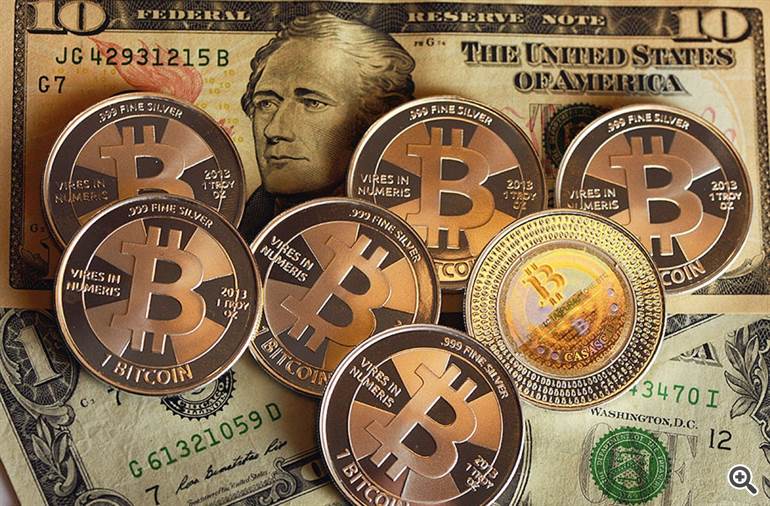Once again Russian authorities discuss whether crypto-currency should be legally regulated. The central bank's first deputy chairman Georgy Luntovsky said this yesterday, speaking at the International Banking Congress.
The recently emerged so-called virtual currencies are at an uncertain position in many countries today - central banks do not want to accept them, and some even prohibit any use on their country territory.
One of the most popular virtual currencies bitcoin was originally a reward to users who connected their computer to the system providing its power to perform certain tasks. The users received bonuses in the form of virtual coins. The system was invented in the 40-ies of the last century, but the monetary currency Bitcoin, developed by the Japanese cryptanalyst Satoshi Nakamoto, was introduced only in 2009.
Of course, the bitcoin currency has its positive and negative aspects. One of the advantages is making direct payments without the mediation of any financial institutions. However, such a payment cannot be canceled - that's its disadvantage (full decentralization and anonymity when using it). Like when paying for items from the online store - here, as opposed to credit card payment, nothing can be proved if the user does not receive the items. Or conversely, items are supplied, but no bitcoins paid.
Very different attitudes towards the virtual currency can be seen from
the
information from the worldwide mass media. For example, at
the end of November 2013 the value of bitcoin first exceeded one
thousand dollars - after the U.S. Senate Committee on Homeland Security
recognized the virtual currency as a legitimate money services. In early
2013 a bitcoin was worth about $20, on the 8th of November - already 323
dollars. As of
early 2014, the world turnover of bitcoins was estimated at about $11
billion.
Most of bitcoin related news concerned its regulation. At the end of
2013
central banks of several countries began to raise questions about the
regulation of the bitcoin currency. Then the European Banking Authority
(EBA) issued a warning on a series of risks deriving from using virtual
currencies.
According to EBA, virtual currencies and relating exchange platforms
were unregulated, so the authorities could not protect consumers in case
such an exchange platform failed or went out of business. In addition,
'digital wallets' stored on computers and smart phones, are not
impervious to hackers, with little prospect of having currencies
returned in case they are lost.
The EBA also reminded that due to high degree of anonymity, they could be misused for criminal activities, including money laundering. Another drawback is the limitations of bitcoins - part of bitcoins are out of circulation simply because consumers forget about them.
Authorities can only close online exchange platforms, and it will only
lead to a
loss of currency. Following the concerns over the uncontrolled movement
of capital and financial stability, in December 2013 Chinese central
bank told third-party payment service providers to stop offering
clearing services to online bitcoin exchanges,
that brought the price of the currency down by 38%.
December 30, 2013, one of India's largest online exchanges selling bitcoin Buysellbitco.in announced the suspension of operations following the statement of the Central Bank of India warning against the risks of using virtual money.
In Russia, only on the 27th of January 2014 Central Bank of Russia warned the population and legal entities from the use of virtual currencies, considering such operations as potentially suspicious. Those providing virtual currencies to rubles exchange services, will be regarded as involved in the laundering of money from crime and terrorist financing. After that, many Russian companies refused to use virtual money.
In February 2014 the site of one of the largest bitcoin-exchanges MtGox was reportedly hacked and more than 744 thousand bitcoins were lost.
Yesterday, July 2, 2014, the first deputy chairman of Russian central
bank Georgy Luntovsky,
speaking at the International Banking Congress said that
crypto-currencies may become legally regulated in the Russian
Federation.
In addition to bitcoin, about 80 clones circulate in the crypto-currency market - peercoin, namecoin, worldcoin, hobonickel, gridcoin, fireflycoin, zeuscoin and others.
The most serious alternative to bitcoin is litecoin, the volume of which
in
circulation was 176.8 million dollars in mid-November 2013, as reported
by
coinmarketcap.com. The litecoin creator software Coinbase engineer
Charlie Lee says that litecoin transactions are processed four times
faster
than bitcoin, while sacrificing some efficiency in the mining process.
However, many experts state that currencies should be traded on proven exchange platforms and using real money. First of all, real exchange cannot be hacked - even if it is located in virtual space. Second, virtual money (especially bitcoins etc.) are unregulated and therefore not protected by the state authorities. Bitcoin use being highly anonymous, it is impossible to prove anything in conflict situations or return stolen funds. Third, why switch to an imperfect trading platform and a virtual currency that does not exist in reality, when there are convenient proven and time-tested technologies, like Forex trade, where there are many tools and applications to help traders.





